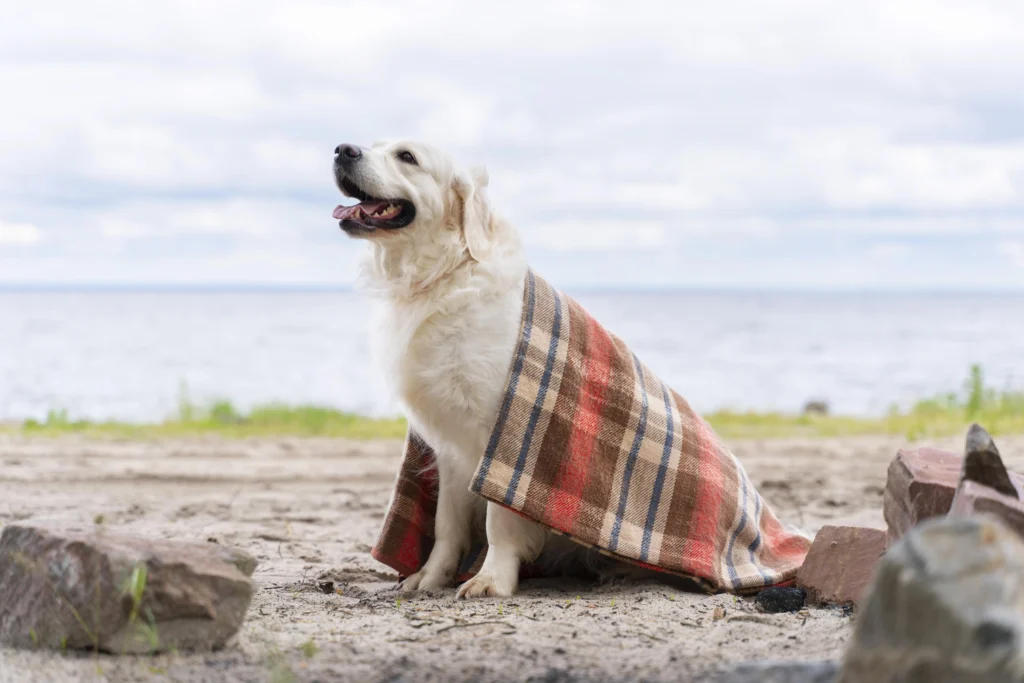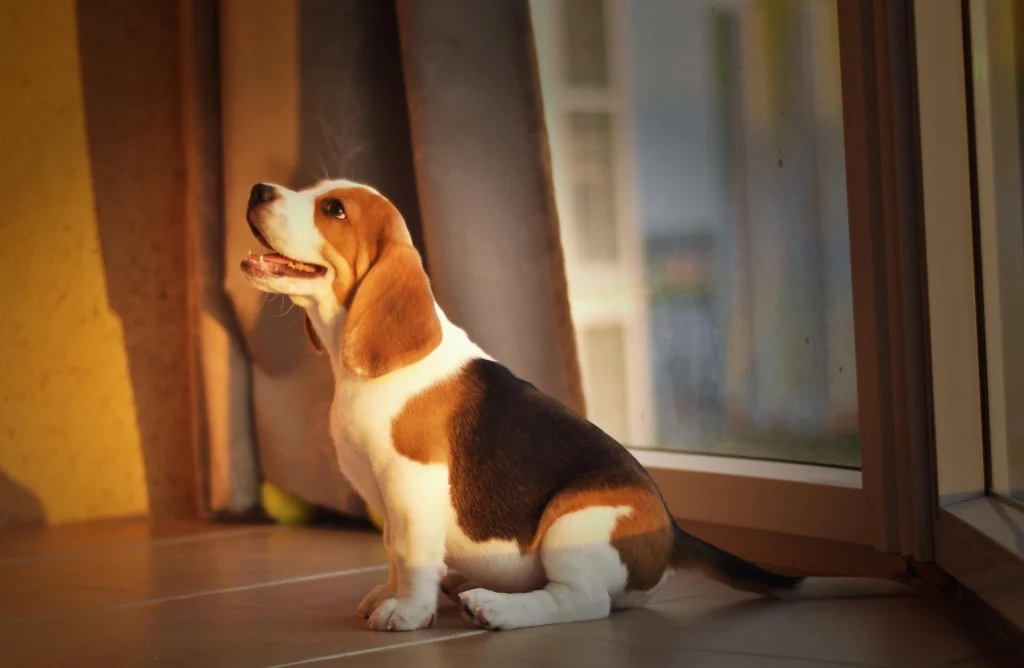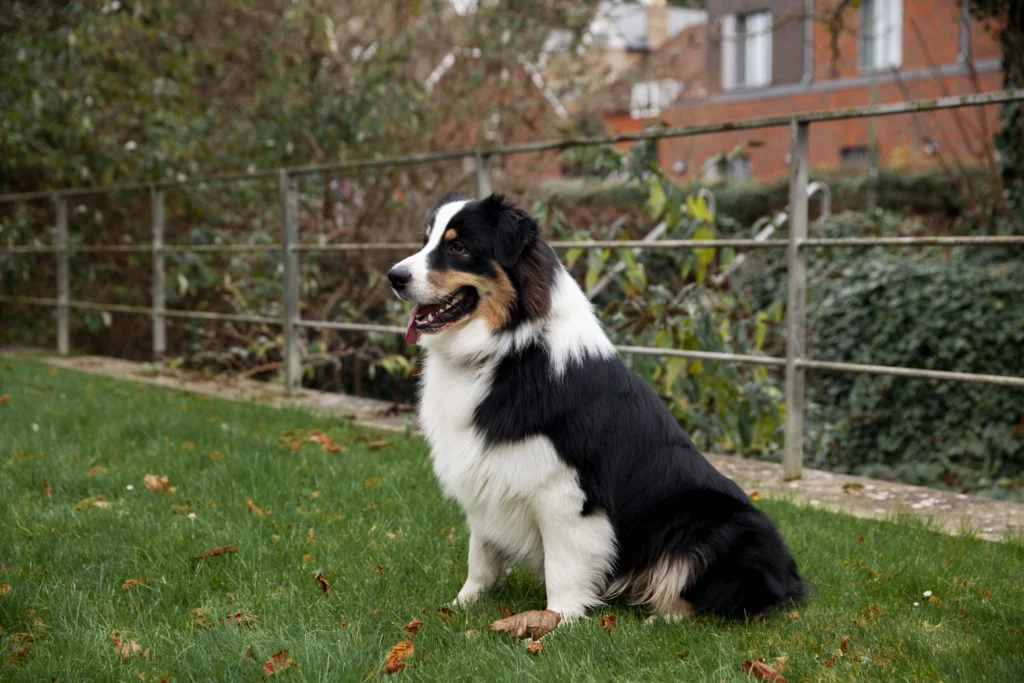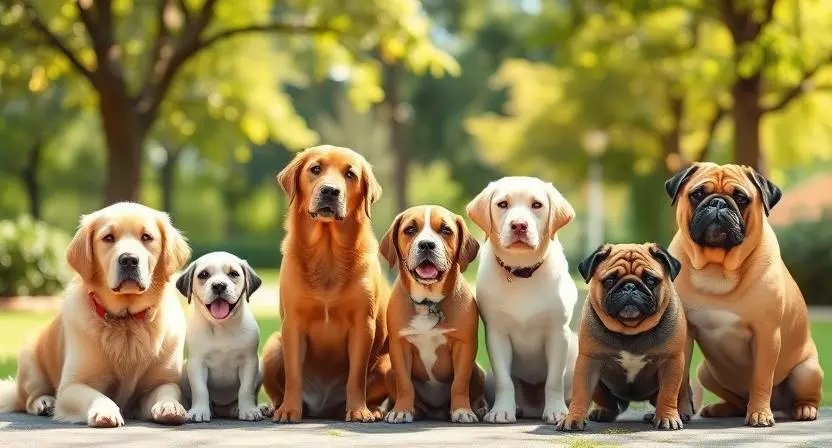15 Non-Aggressive Dog Breeds: Your Complete Guide to Gentle Companions
Table of Contents
Picture this: A young family walks into a dog rescue center, their children’s eyes lighting up at every wagging tail. The parents exchange nervous glances, whispering the same concern that echoes in countless households: “Which dog will be safe with our kids?” If you’re asking this question, you’re not alone—and you’re asking the right one.
The Truth About “Non-Aggressive” Dogs
Before we dive into our list of gentle breeds, let’s address the elephant in the room: no dog breed is inherently aggressive or non-aggressive by default. When we talk about non-aggressive dog breeds, we’re discussing breeds with historically low aggression tendencies, bred primarily for companionship rather than guarding or protection work. These non-aggressive dog breeds have been selectively bred for centuries to work alongside humans peacefully.
The most critical factors in determining a dog’s temperament are:
- Early socialization (exposure to various people, animals, and environments)
- Consistent, positive training
- The individual dog’s environment and treatment
- Responsible breeding practices
This guide will explore 15 non-aggressive dog breeds known for their gentle nature, bred specifically for companionship and cooperation with humans. These sociable dog breeds have temperament traits that make them excellent family pets when properly cared for. Understanding which non-aggressive dog breeds suit your lifestyle is crucial for finding the perfect companion.
Understanding Temperament: What Makes a Dog “Gentle”?
Not all dogs were created equal—and that’s by design. For centuries, humans have selectively bred dogs for specific jobs, inadvertently shaping their temperaments in the process.
Breed History Shapes Behavior
Retrievers were bred to have “soft mouths”—they needed to bring back game birds without damaging them, requiring incredible bite inhibition and gentleness. Companion breeds were developed solely to be pleasant household members, while herding dogs needed to work cooperatively without showing aggression toward livestock.
Key Temperament Traits in Gentle Breeds
When evaluating non-aggressive dog breeds, look for these characteristics:
| Trait | Description | Why It Matters |
|---|---|---|
| High Bite Inhibition | Natural control over bite pressure | Prevents accidental injury during play |
| Patience | Tolerance for handling and disruption | Essential for homes with children |
| Sociability | Enjoys interaction with humans and other animals | Reduces fear-based reactive behaviors |
| Low Prey Drive | Minimal instinct to chase or catch | Safer around small pets and children |
The Owner’s Role: Non-Negotiable Responsibilities
Even the most naturally gentle breed requires proper socialization during the critical period (3-14 weeks of age). Without early exposure to various people, animals, sounds, and environments, any dog can develop fear-based behavioral issues.
The Main List: 15 Genuinely Gentle Non-Aggressive Dog Breeds
When searching for non-aggressive dog breeds, these 15 breeds consistently rank among the most peaceful and family-friendly options available.
1. Labrador Retriever – The Classic Family Dog
Quick Facts
- Temperament: Friendly, Outgoing, Active
- Size: Medium to Large (55-80 lbs)
- Energy Level: High
- Good with Kids: Excellent
- Good with Pets: Yes

Why They Are So Amiable:
- Bred for Cooperation: Originally developed to work closely with hunters, requiring calm, non-aggressive behavior
- Retrieving Instinct: Their “soft mouth” breeding means they naturally control bite pressure
- People-Pleasing Nature: Selected for eagerness to work with humans, making them highly trainable
Ideal Home & Owner:
- Active families who can provide daily exercise and mental stimulation
- Homes with yards preferred, though they adapt to apartments with sufficient exercise
- First-time owners welcome—they’re forgiving of training mistakes
Potential Considerations:
- High Energy: Requires substantial daily exercise (60+ minutes)
- Shedding: Heavy seasonal shedding requires regular grooming
2. Golden Retriever – The Family Favorite
Quick Facts
- Temperament: Intelligent, Friendly, Devoted
- Size: Medium to Large (55-75 lbs)
- Energy Level: Moderate to High
- Good with Kids: Excellent
- Good with Pets: Excellent
Why They Are So Amiable:
- Gentle Breeding: Developed specifically for retrieving waterfowl with minimal damage
- Pack Mentality: Bred to work in groups, promoting cooperative rather than competitive behavior
- Emotional Intelligence: Exceptionally tuned to human emotions and body language
Ideal Home & Owner:
- Families seeking a patient, trainable companion
- Homes that can accommodate regular grooming needs
- Owners who enjoy outdoor activities and can provide mental stimulation
Potential Considerations:
- Grooming Needs: Requires brushing 3-4 times weekly to prevent matting
- Cancer Predisposition: Higher rates of certain cancers compared to other breeds
3. Beagle – The Merry Hound
Quick Facts
- Temperament: Merry, Curious, Friendly
- Size: Small to Medium (20-30 lbs)
- Energy Level: High
- Good with Kids: Excellent
- Good with Pets: Generally Yes

Why They Are So Amiable:
- Bred for Pack Life: Developed to hunt in large packs, requiring non-confrontational behavior with other dogs
- Merry Disposition: Their cheerful nature makes them more curious than suspicious of strangers
- Not a Guard Dog: Never bred for protection, so they lack territorial aggression
Ideal Home & Owner:
- Active families who can handle their energy and vocal nature
- Homes with secure yards due to their strong scent-hound instincts
- Patient owners who understand hound independence
Potential Considerations:
- Vocalization: They bay and howl loudly, which may disturb neighbors
- Stubbornness: Their single-mindedness on scents can make training challenging
4. Bichon Frise – The Cheerful Companion
Quick Facts
- Temperament: Playful, Curious, Peppy
- Size: Small (12-18 lbs)
- Energy Level: Moderate
- Good with Kids: Good (with proper socialization)
- Good with Pets: Yes
Why They Are So Amiable:
- Companion Breeding: Developed solely as companion dogs for nobility
- Cheerful Nature: Bred for entertainment and companionship, not work
- Adaptable Size: Small enough to be non-threatening, reducing defensive behaviors
Ideal Home & Owner:
- Apartment dwellers or those with limited space
- Owners who enjoy grooming or can afford professional grooming
- Families looking for a smaller, gentle dog
Potential Considerations:
- Grooming Requirements: Requires professional grooming every 6-8 weeks
- Separation Anxiety: Can develop anxiety when left alone for extended periods
5. Cavalier King Charles Spaniel – The Ultimate Lap Dog
Quick Facts
- Temperament: Affectionate, Gentle, Graceful
- Size: Small (13-18 lbs)
- Energy Level: Low to Moderate
- Good with Kids: Excellent
- Good with Pets: Excellent
Why They Are So Amiable:
- Royal Companion: Bred exclusively for companionship in royal courts
- Gentle Selection: Generations of breeding for docile, sweet temperaments
- Spaniel Heritage: Sporting dog background without the intensity of working breeds
Ideal Home & Owner:
- Families with children who want a gentle, patient dog
- Seniors or those seeking a calm companion
- Apartments or smaller homes are perfectly suitable
Potential Considerations:
- Health Issues: Prone to heart conditions and neurological problems
- Gentle Nature: May not be suitable for very rough play
6. Irish Setter – The Elegant Friend
Quick Facts
- Temperament: Outgoing, Sweet-Natured, Active
- Size: Large (60-70 lbs)
- Energy Level: High
- Good with Kids: Excellent
- Good with Pets: Good
Why They Are So Amiable:
- Sporting Heritage: Bred to work cooperatively with hunters
- Gentle Mouth: Retrieving background requires soft, controlled bite
- Social Nature: Developed to work in groups, promoting friendly behavior
Ideal Home & Owner:
- Active families who enjoy outdoor activities
- Homes with large yards for running and playing
- Owners who can provide consistent training and socialization
Potential Considerations:
- High Energy: Requires substantial daily exercise and mental stimulation
- Slow Maturation: Can remain puppy-like for 2-3 years
7. Newfoundland – The Gentle Giant
Quick Facts
- Temperament: Sweet, Patient, Devoted
- Size: Giant (100-150 lbs)
- Energy Level: Low to Moderate
- Good with Kids: Excellent
- Good with Pets: Good
Why They Are So Amiable:
- Water Rescue Heritage: Bred to save drowning sailors, requiring calm, controlled behavior
- Gentle Strength: Selected for power combined with restraint and gentleness
- Nanny Dog Reputation: Historically trusted with children due to their patient nature
Ideal Home & Owner:
- Families with space for a large dog
- Those seeking a calm, protective but non-aggressive companion
- Owners who can manage grooming and drooling
Potential Considerations:
- Size and Space: Requires adequate indoor and outdoor space
- Grooming Needs: Heavy coat requires regular brushing and professional grooming
8. Basset Hound – The Placid Sniffer
Quick Facts
- Temperament: Placid, Patient, Low-Key
- Size: Medium (40-65 lbs)
- Energy Level: Low
- Good with Kids: Excellent
- Good with Pets: Excellent
Why They Are So Amiable:
- Pack Hunting Heritage: Bred to work in groups without aggression
- Laid-Back Nature: Low energy and calm disposition
- Scent-Focused: More interested in smells than confrontation
Ideal Home & Owner:
- Families seeking a calm, patient dog
- Apartment living suitable with daily walks
- Owners who can handle some stubbornness and vocalization
Potential Considerations:
- Stubbornness: Can be independent and challenging to train
- Health Issues: Prone to back problems and bloat
9. Bernese Mountain Dog – The Good-Natured Guardian
Quick Facts
- Temperament: Good-Natured, Patient, Strong
- Size: Large (80-115 lbs)
- Energy Level: Low to Moderate
- Good with Kids: Excellent
- Good with Pets: Good

Why They Are So Amiable:
- Farm Dog Heritage: Bred to work with families, not as guard dogs
- Gentle Strength: Selected for power combined with gentle temperament
- Family-Oriented: Developed to be integral parts of farming families
Ideal Home & Owner:
- Families with space for a large dog
- Those seeking a calm, gentle giant
- Owners who understand shorter lifespans (6-8 years)
Potential Considerations:
- Short Lifespan: Unfortunately shorter than many breeds
- Seasonal Shedding: Heavy coat requires regular grooming
10. Greyhound – The Couch Potato
Quick Facts
- Temperament: Calm, Gentle, Noble
- Size: Large (60-70 lbs)
- Energy Level: Low (with short bursts)
- Good with Kids: Good (with proper introduction)
- Good with Pets: Good (except small pets due to prey drive)
Why They Are So Amiable:
- Gentle Athletes: Bred for speed, not aggression
- Calm Nature: Surprisingly low-energy for a sight hound
- Sensitive Souls: Gentle, sensitive temperament
Ideal Home & Owner:
- Families seeking a calm, low-maintenance large dog
- Apartment living suitable
- Owners who can provide short bursts of exercise
Potential Considerations:
- Prey Drive: May chase small pets or animals
- Sensitivity: Can be sensitive to loud noises and harsh treatment
11. Pug – The Comical Charmer
Quick Facts
- Temperament: Charming, Mischievous, Loving
- Size: Small (14-18 lbs)
- Energy Level: Low to Moderate
- Good with Kids: Good
- Good with Pets: Generally Yes
Why They Are So Amiable:
- Companion Breeding: Developed solely as companion dogs
- Clownish Nature: Bred for entertainment and companionship
- Social Butterflies: Naturally friendly and outgoing
Ideal Home & Owner:
- Apartment dwellers or those with limited space
- Families looking for a small, entertaining companion
- Owners who can manage breathing-related health issues
Potential Considerations:
- Breathing Issues: Flat face can cause respiratory problems
- Weight Management: Prone to obesity if overfed
12. Shih Tzu – The Affectionate “Lion Dog”
Quick Facts
- Temperament: Affectionate, Playful, Outgoing
- Size: Small (9-16 lbs)
- Energy Level: Low to Moderate
- Good with Kids: Good (with proper socialization)
- Good with Pets: Good
Why They Are So Amiable:
- Palace Companion: Bred exclusively for Chinese royalty as companions
- Gentle Selection: Centuries of breeding for docile, friendly temperaments
- Lap Dog Heritage: Developed to be loving, close companions
Ideal Home & Owner:
- Families seeking a small, affectionate companion
- Apartment living perfectly suitable
- Owners who can commit to regular grooming
Potential Considerations:
- Grooming Needs: Requires daily brushing and regular professional grooming
- Small Size: May not be suitable for homes with very young children
13. Standard Poodle – The Intelligent Athlete
Quick Facts
- Temperament: Intelligent, Active, Alert
- Size: Large (45-70 lbs)
- Energy Level: High
- Good with Kids: Excellent
- Good with Pets: Good
Why They Are So Amiable:
- Water Retriever Heritage: Bred to work cooperatively with hunters
- High Intelligence: Easy to train and eager to please
- Hypoallergenic Coat: Less likely to trigger allergies
Ideal Home & Owner:
- Active families who can provide mental and physical stimulation
- Owners who enjoy training and dog sports
- Families with allergies (hypoallergenic coat)
Potential Considerations:
- High Intelligence: Requires mental stimulation to prevent boredom
- Grooming Needs: Requires professional grooming every 6-8 weeks
14. Clumber Spaniel – The Placid Specialist
Quick Facts
- Temperament: Calm, Gentle, Dignified
- Size: Large (55-85 lbs)
- Energy Level: Low to Moderate
- Good with Kids: Excellent
- Good with Pets: Good
Why They Are So Amiable:
- Aristocratic Heritage: Bred for nobility, emphasizing calm temperament
- Gentle Hunter: Developed for quiet, controlled hunting
- Steady Nature: Known for their unflappable, calm demeanor
Ideal Home & Owner:
- Families seeking a calm, large dog
- Those who prefer a less common but gentle breed
- Owners who can handle moderate grooming needs
Potential Considerations:
- Drooling: Can be messy drinkers and droolers
- Availability: Less common breed, may be harder to find
15. Great Dane – The Apollo of Dogs
Quick Facts
- Temperament: Friendly, Patient, Dependable
- Size: Giant (110-175 lbs)
- Energy Level: Low to Moderate
- Good with Kids: Excellent
- Good with Pets: Good
Why They Are So Amiable:
- Gentle Giant: Despite their size, bred for gentle temperament
- Family Heritage: Developed to be family companions, not guard dogs
- Calm Nature: Surprisingly calm and patient for their size
Ideal Home & Owner:
- Families with adequate space for a giant breed
- Those seeking a gentle, impressive companion
- Owners who understand giant breed needs and shorter lifespans
Potential Considerations:
- Size Requirements: Needs significant space and special considerations
- Shorter Lifespan: Unfortunately shorter than smaller breeds (8-10 years)
Finding the Right Breed for Your Lifestyle
Best for Families with Small Children:
- Newfoundland – Patient and protective without aggression
- Labrador Retriever – Playful yet gentle with excellent bite inhibition
- Cavalier King Charles Spaniel – Small enough to be non-threatening, gentle enough for toddlers
- Basset Hound – Calm, patient, and tolerant of handling
Best for Apartment Living:
- Bichon Frise – Small, adaptable, and moderate energy
- Greyhound – Surprisingly low-energy “couch potato”
- Cavalier King Charles Spaniel – Perfect apartment size with gentle nature
- Pug – Small, social, and adaptable to smaller spaces
Best for First-Time Owners:
- Standard Poodle – Highly intelligent and eager to please
- Bichon Frise – Forgiving temperament and moderate size
- Labrador Retriever – Excellent trainability and forgiving nature
- Golden Retriever – Patient and responsive to training
Most Tolerant of Other Pets:
- Golden Retriever – Excellent with cats and other dogs
- Basset Hound – Pack heritage makes them naturally social
- Beagle – Bred to work in groups, generally good with other pets
- Cavalier King Charles Spaniel – Gentle with other animals
Frequently Asked Questions
Are mixed-breed dogs less aggressive?
Mixed-breed dogs can be just as gentle as purebreds, often combining the best traits of their parent breeds. However, temperament depends more on individual genetics, socialization, and training than on being mixed or purebred.
At what age does aggression typically show up in dogs?
Most behavioral issues, including aggression, become apparent between 6 months to 2 years of age. This is why early socialization (3-14 weeks) and consistent training throughout the first year are crucial.
Can a dog from an “aggressive breed” be gentle?
Absolutely. Any dog, regardless of breed, can be gentle with proper socialization, training, and care. Breed tendencies are just that—tendencies, not guarantees. The individual dog’s experiences and treatment matter far more than breed labels.
Where is the best place to find a non-aggressive dog?
The best sources are:
- Reputable breeders who health test and temperament test their breeding dogs
- Rescue organizations that perform temperament evaluations
- Breed-specific rescues that understand their breeds’ needs
- Avoid puppy mills, pet stores, and backyard breeders who prioritize profit over temperament
Your Journey to a Peaceful Companion
Choosing one of these non-aggressive dog breeds is just the beginning of your journey. Remember that even the most naturally gentle breed requires:
Consistent socialization from an early age Positive, reward-based training methods Regular exercise and mental stimulation Proper veterinary care and nutrition A loving, stable home environment
The perfect gentle companion is out there waiting for you. Whether you choose a playful Labrador, a calm Newfoundland, or a cheerful Bichon Frise, you’re investing in years of loyalty, love, and peaceful companionship.
Your ideal sociable dog breed depends on your lifestyle, living situation, and personal preferences. Take time to research, meet potential breeds, and choose based on your family’s long-term commitment to providing the love, training, and care that every dog deserves.
Remember: every dog is an individual. While these breeds have reputations for gentleness, the most important factor in raising a well-behaved, non-aggressive dog is you—the owner who provides consistent love, boundaries, and positive experiences throughout their life.


